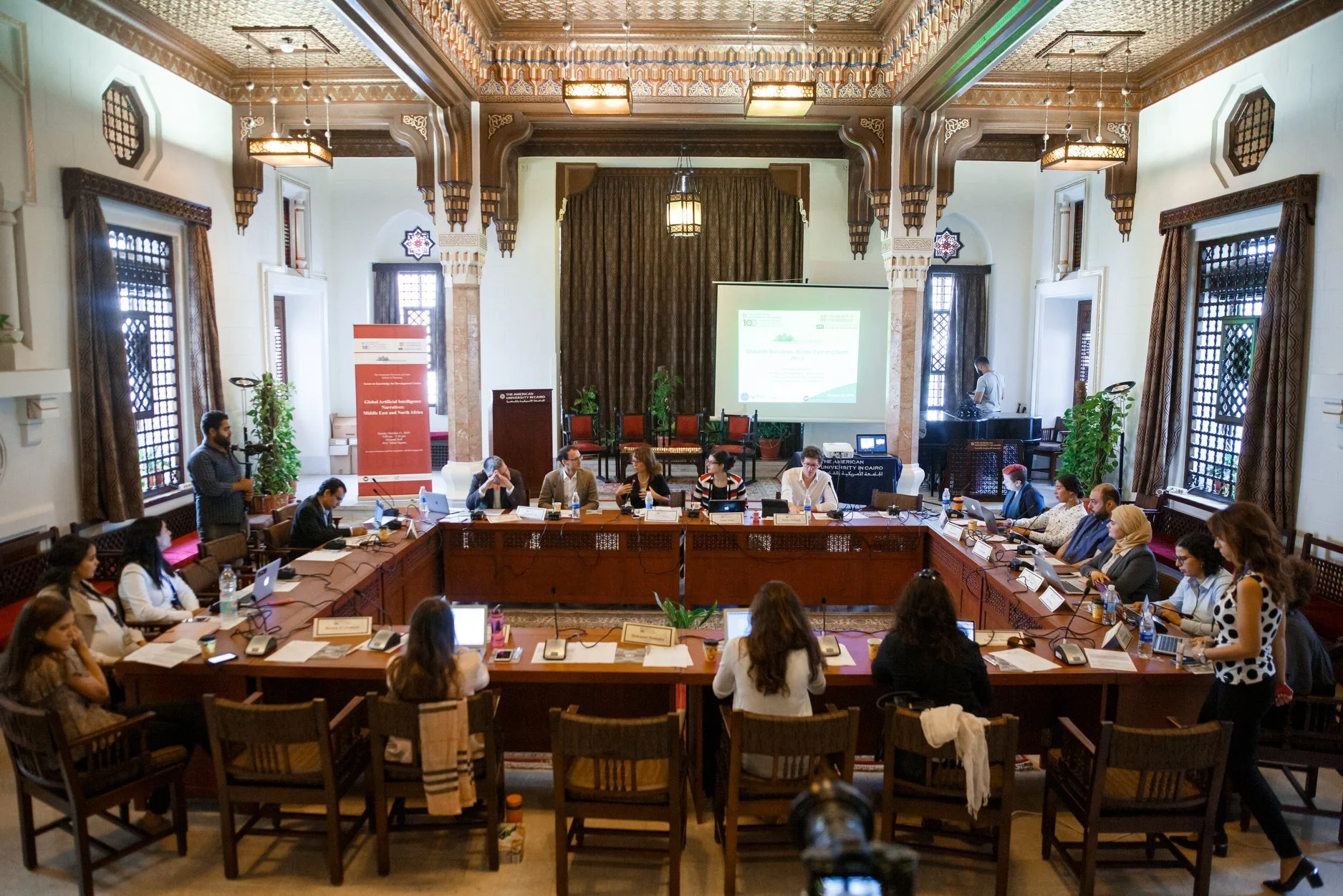Following research events in Singapore, Tokyo and Saint Petersburg, the Global AI Narratives (GAIN) team collaborated with the Access to Knowledge for Development Center (A2K4D) at the American University in Cairo to organize a workshop in the capital of Egypt and probe the imaginings of artificial intelligence in the Middle East and North Africa (MENA).
The MENA region is hugely overlooked by the Western mainstream when it comes to debating the future of artificial intelligence. Recognizing the vital importance of diversity in the global debate on what AI is and should be, the MENA GAIN workshop in Cairo aimed to set up a new intellectual space for researchers, artists and technologists working on AI in the region, and allow them to not only deliberate over how the vision of technology spreading in the Arab world might differ from that dominating in the West – but also how this vision can shape the development and future use of AI globally.
The Cairo team led by Dr Nagla Rizk and Nadine Weheba collaborated with CFI’s Dr Kanta Dihal and Tomasz Hollanek to gather a group of academics, technologists and storytellers representing a variety of backgrounds and countries from the region, including Egypt, UAE, Saudi Arabia, Lebanon and Algeria. In preparation for the workshop, the invited participants were asked to think about the following questions:
How is AI portrayed in the Middle East and North Africa and what are the ‘local’ understandings of AI?
What is the relationship between the Islamic thought and scholarship and mechanisation, automation, and AI?
How is the question of AI and gender specific to the region?
Is there an Arab Futurism?
Each question served as a starting point for one of the workshop panel discussions. The workshop took place on 13 October 2019 in the historic Oriental Hall of the AUC’s Tahrir Square Campus.
Dr Rizk moderated the introductory panel that traced the Western conception of AI. It featured presentations by CFI’s Executive Director Dr Stephen Cave, who spoke about the ideological history of intelligence, GAIN’s Principal Investigator Dr Kanta Dihal, who shared her findings on the hopes and fears for AI in the English-speaking world, and CFI’s Student Fellow Tomasz Hollanek, who discussed the cultural history of artificiality in the West.
The second panel, moderated by Dr Dihal, was devoted to contemporary perceptions of AI in the MENA region, as reflected in popular culture. The speakers included Dr Nikolaos Mavridis (Interactive Robots and Media Lab, UAE), the designer of the first Arabic-speaking, conversational humanoid robot ‘Ibn Sina,’ Yasser Bahjatt (Saudia Arabia), a computer engineer and bestselling sci-fi writer, the author of the alternative history novel Yaqteenya, as well as Dr Iman Hamam (AUC, Egypt), who analyzed the images of robots, cyborgs and automata in contemporary Arabic writing and film, and Dr Reham Hosny (University of Leeds, UK, and Minia University, Egypt), who theorized her own experiments with electronic literature and reflected on the future of AI in cultural production.
The following panel, moderated by Tonii Leach, Research Assistant to the GAIN Project, focused on the question of gender, race and class in relation to technological development in MENA. Assia Boundaoui, an Algerian-American journalist and filmmaker, presented her most recent work, the Inverse Surveillance Project, which uses machine learning to disrupt and re-claim narratives about the community of Arab Muslims living in the US. This was followed by two presentations by AUC researchers: Dr Yasmine Moataz Ahmed’s talk adopted an anthropological angle and raised the question of religion in MENA, while Farah Ghazal argued in her paper that situating AI in the material, socioeconomic and political context of MENA is necessary for exploring the implications of the technology for the Global South. The panel was closed by Mohamed Hamama, an Egyptian journalist, who spoke about the discourse surrounding AI in the Arabic/Egyptian media and how that reflects the perceived position of the region in the global context.
A2K4D Researcher Hana Shaltout moderated the final panel on the Arab Futurism. This included a remote presentation by Dr Imad H. Elhajj (American University of Beirut) on the impact of the Fourth Industrial Revolution on technological development in the Arab region and a talk by Hosam A. Ibrahim Elzembely (delivered in Arabic and interpreted into English), a professor of ophthalmology and founder of the Egyptian Society for Science Fiction. Dr Muhammad Aurangzeb Ahmad (Department of Computer Science at the University of Washington), the founder of the Islam and Science Fiction website, analyzed the relationship between Islamic thought and futurism/science fiction, and discussed the dangers of self-orientalization. Finally, Aya El Sharkawy (AUC, Egypt) talked about her project ‘Speculative Data Futures’ – a series of short sci-fi stories that explores the intersection of gender and technology in the MENA region.
The following day, Stephen Cave, Yasser Bahjatt, Hosam A. Ibrahim Elzembely and Assia Boundaoui took part in a panel on AI Narratives open to the public. More on the public panel and the accompanying conference organized by our AUC partners can be found here.
More information about the GAIN MENA workshop, individual presentations and the MENA network of AI technologists, researchers and storytellers can be found here.
The findings from the workshop will be published in the form of a peer-reviewed report, produced in collaboration with CFI’s partners from AUC in 2020.
Blog post by Tomasz Hollanek


